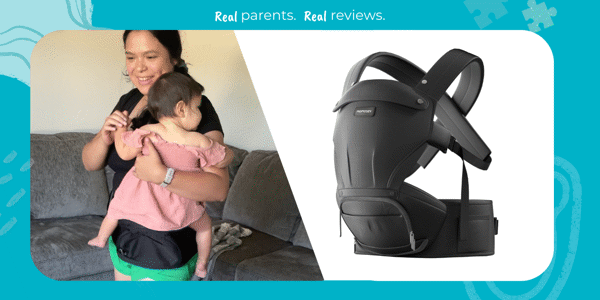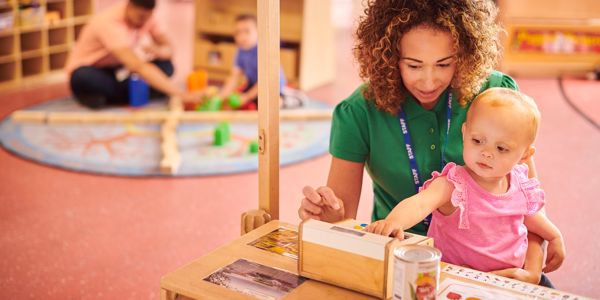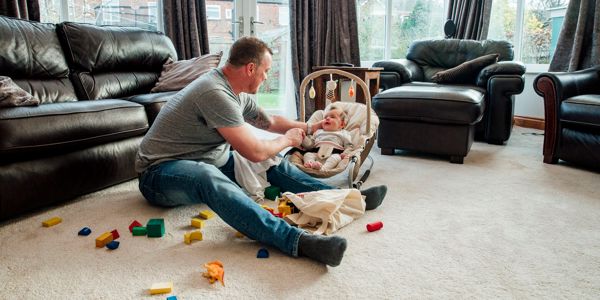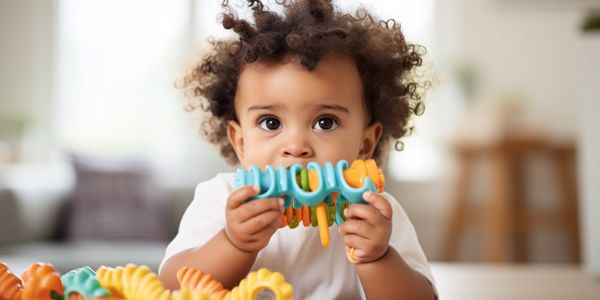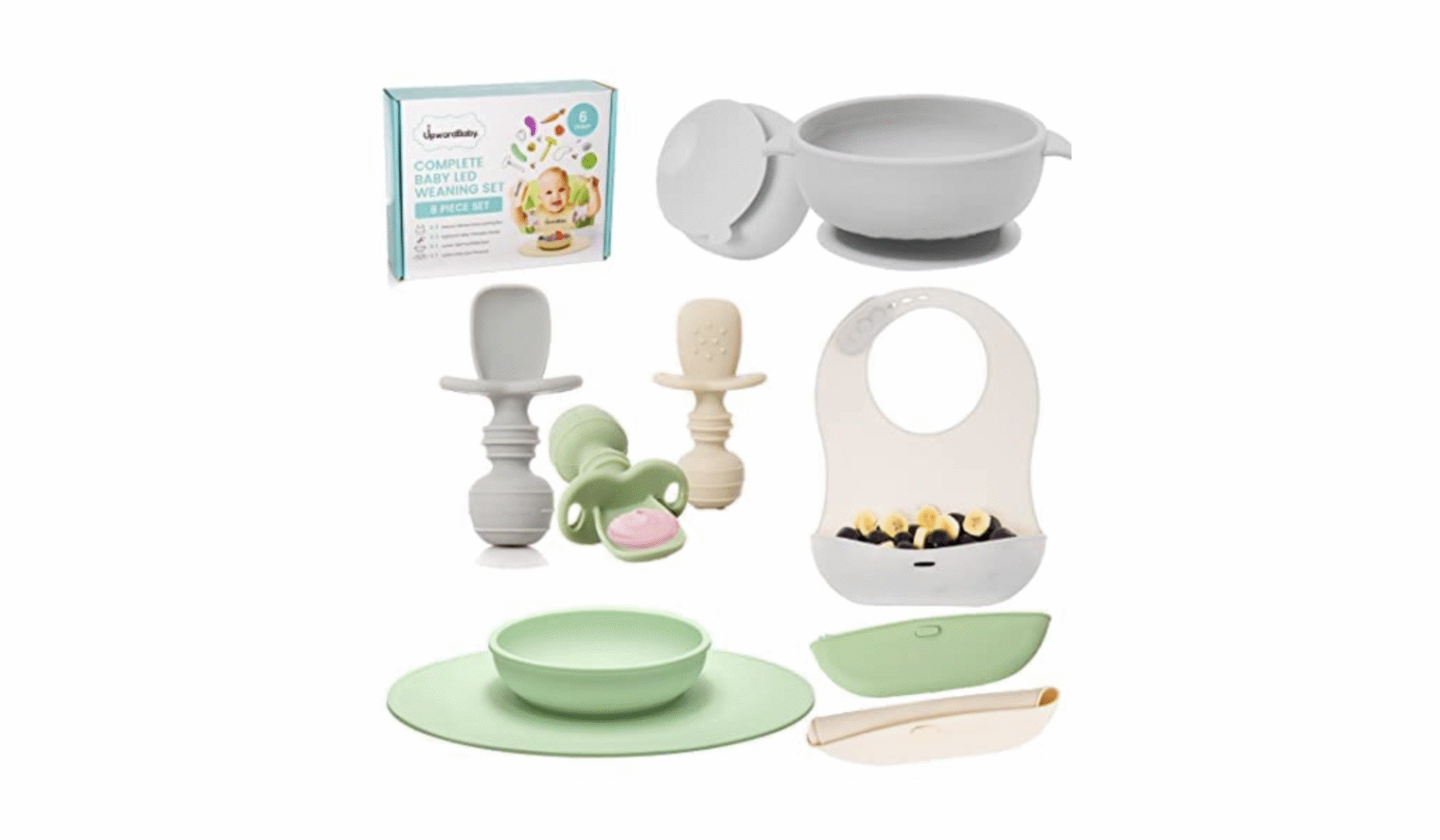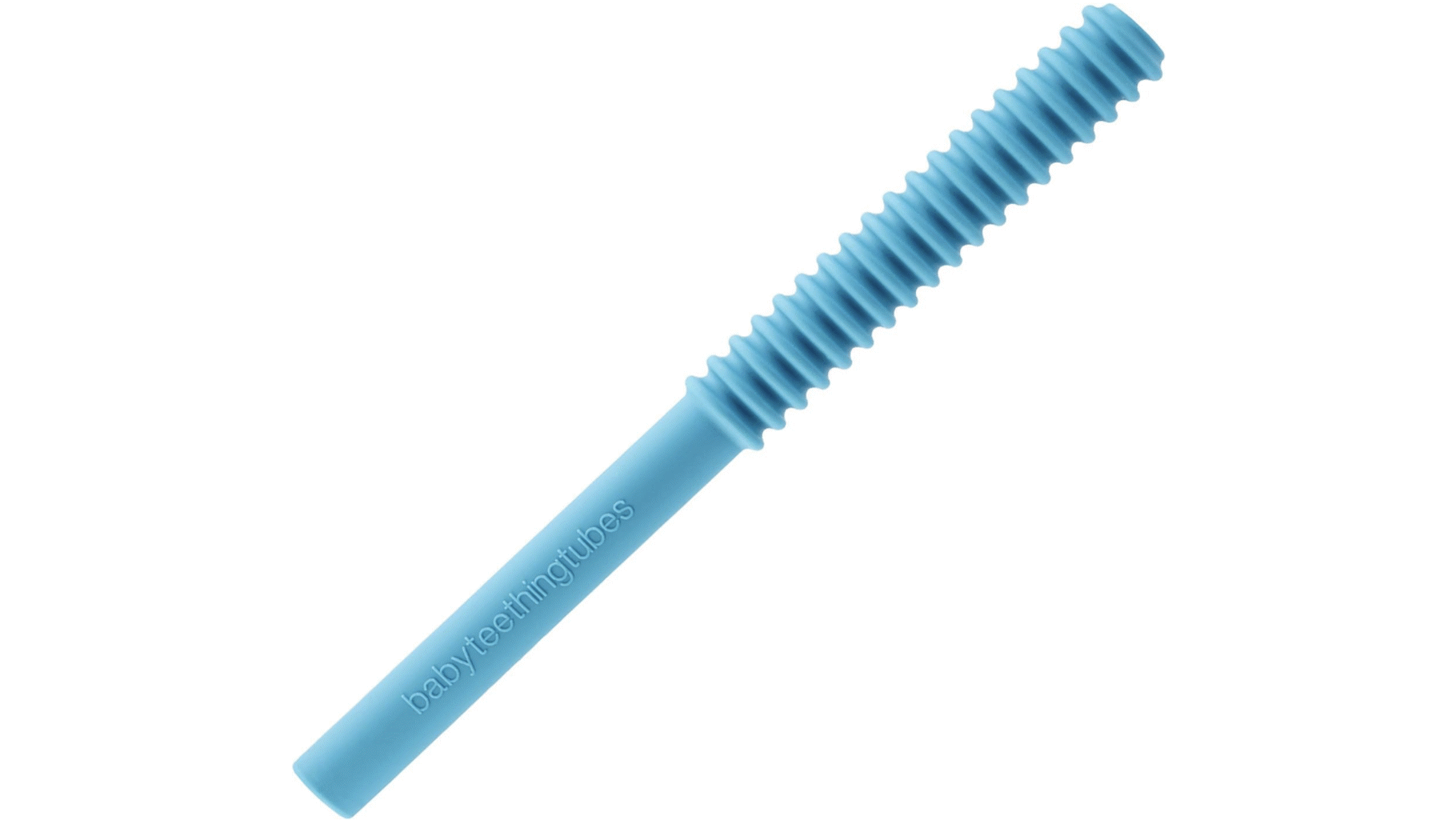7-Month-Old
This week, your baby is becoming more of their own person. By now, your little one knows what they want and how to get your attention when they need you. It is possible that your baby even understands what signals get your attention faster than others or what causes a positive or negative response from you. This exciting time will make communication with your little one so much easier.
As you spend each day with your baby, they will likely become attached to you. This is a precious feeling, but it is also essential to help them feel comfortable and safe without you. Helping your little one work on their independence this week will benefit them.
By now, your baby's confidence has likely increased, leading to them becoming more demanding and impatient than usual. As cute as they can be, try not to give in to your baby's demands, as it will send them the wrong message that this is how they get their way.
Your baby has developed a special connection with you and likely feels safest when they are with you. This is a great feeling and will remind you what a great parent you are, but it is important to help them feel safe and comfortable without you, too.
Separation anxiety is hard on your baby, and the bond you two have is magical and cannot be taken by anyone. If you haven't needed to yet, you will eventually find yourself in a situation where you need to hire a babysitter, use a daycare, or leave your baby in the care of a family member. You will not want your baby to become anxious or feel unsafe if you are not present and need someone to look after them.
Separation anxiety is a common stage in child development and can be hard on you and your little one. This feeling of anxiety occurs when your baby is placed in an unfamiliar environment with new people or in a setting without you. This is an expected time for your child to start experiencing these feelings, especially if you spend most of your time together. These feelings of separation anxiety can last for years, which is why it’s best to try and prevent it from becoming a serious issue.
If your baby does not like being separated from you, there are a variety of steps you can take to help them become more comfortable without your presence. There is no single cause of separation anxiety. Still, it can occur in children who have overprotective parents, specific triggers or fears, or those who inherit anxiety from a parent.
Signs that your child has separation anxiety include being afraid to do anything without a parent. Other signs that your child suffers from separation anxiety are refusing to interact with other babies, refusing to be left with a caretaker, or refusing to do new things. Helping your child feel safe without you present is something to start early on in their life to help prevent them from developing this anxiety.
As your baby enters this month, you could be in one of two stages. You might find yourself experiencing a mix of joy and exhaustion, still struggling to navigate your little one's sleeping pattern. It might be that you have not slept a whole night’s sleep since they were born, which can take its toll. Or, you might have a little one who's already sleeping through the night.
Either way, by now, you've come to know your baby's patterns and preferences and are likely used to whatever routine they're in. Around this month, most little ones will sleep for around 11 hours at night. Many will be sleeping through the night at this point, but if your little one isn't, don’t be too hard on yourself. Each baby is different; one in four babies doesn't regularly sleep 8 hours through the night until they're more than one year old. So, you’re certainly not the only one, and you’re not doing anything wrong.
Throughout this month, your little one's fine motor skills will be getting better and better. Fine motor skills involve the coordination of small muscles in the hands and fingers, letting your baby perform more precise movements and interact with their environment.
Your baby's motor skills are becoming more refined, allowing them to explore objects, develop hand-eye coordination, and pave the way for future activities such as grasping, writing, or even tying their shoes.
They can now grasp objects using their whole hand rather than just reflexive grasp. You might notice them reaching for toys, fingers, and even your own hand, wanting to try out their newfound skills. With grasping now being a more meaningful action, now is the time to teach them that your hair is a no-grab zone!
If you have been experiencing hair loss within the past few months, you may be confused, especially since your hair was just feeling so healthy and luxurious throughout your pregnancy. This hair loss after your birth is due to your estrogen levels dropping and your new hair follicles beginning to shed.
Your estrogen levels rise throughout pregnancy, so your hair likely felt luxurious while you were pregnant with your baby. Now that your estrogen levels are returning to or have already returned to normal, you will notice your new hairs are short and wispy. This is frustrating to deal with, but there isn’t much you can do to prevent postpartum hair loss, so try your best just to get through this time.
One challenge that you might face around this stage is navigating the journey of weaning your little one to solid foods. While the weaning journey is filled with excitement, it also comes with its fair share of challenges as a mom.
When getting started with weaning, it's important to recognize the patience required throughout the process and the potential difficulties that can arise.
Weaning introduces an entirely new dimension to your life as a parent: meal preparation. Gone are the days of solely relying on breast milk or formula. It’s time to plan and create nutritious, age-appropriate meals for your little one. Many moms enjoy this new challenge, but there’s no denying that the shift requires a lot more time, preparation, and consideration.
This can be especially challenging amid other responsibilities, especially if your little one hasn’t mastered their sleep routine yet. If it’s taking you some time to adjust to the needs of weaning, don’t be too hard on yourself. At this stage, your baby is still getting the majority of their nutrients from milk throughout the day. Weaning is largely for fun at this stage and is more about getting them used to all of the different flavors and textures out there.
Another thing to remember is not to be too upset or disheartened if your baby shows no interest in the foods you’ve prepared for them or if more of it ends up on the floor than in their mouth. Trust us, this is normal!
Babies are naturally curious but can also be cautious about new tastes and textures. Stay patient and persistent, offering foods multiple times to let your baby get used to them.
Taking your baby outside of their playroom to play is a great idea! Joining any local playgroups or going to public places where your baby can interact with other babies is great for their development. Exposing your baby to other babies and new faces will help them become more comfortable with people outside of your immediate family.
Joining a “mommy and me” class is also a beneficial activity for both of you! Helping your baby interact with others can help avoid separation anxiety, and these classes are a wonderful way to get children who are beginning to experience separation anxiety out of their shells.
Allowing your baby to meet and interact with new people while you are present will help them ensure their safety. If your baby is scared to leave your side or hesitates to interact with other babies or toys, that is okay. Provide your little one with encouragement, and eventually, they may give it a try!
After they crawl over to other kids or play with a toy, congratulate them and let them know you are proud of them! Celebrating their small achievements will help your baby's confidence flourish and help them to continue branching out and being independent.
This week, we've got you covered with some tips regarding how to prevent separation anxiety. As early on in your baby's life as possible, making them feel safe even when you are not present is essential. You can do this by reassuring your child how loved they are and introducing him to new people of all ages.
The first tip for preventing separation anxiety is to always let your baby know when you are leaving. It will help you if you come up with a quick and fun goodbye ritual for when you leave your baby. Letting your baby know when you are leaving rather than sneaking out when they are distracted will prevent them from becoming stressed or worried that you disappeared.
Keep your goodbyes short and sweet with a quick kiss on the head or cheek, and control your emotions. If you feel emotional, keep it inside and do not let your little one see; it may further upset them. If your baby does not have a favorite stuffed animal or blanket by now, helping them choose a comfort toy can benefit them through these transitional stages of their life.
Comfort toys are also referred to as transitional objects and can help your little one feel safe when you are not around.
At this point of your baby's life, they have become more familiar with their surroundings and respond to specific sounds and voices. As your baby continues to teethe, you may notice a few tiny teeth breaking through this week! Thanks to your baby's curiosity, which motivates them to crawl around more, their legs and hand-eye coordination are strengthening! While these physical milestones and muscle developments are fun to look for, keep an eye out for how they respond to certain words. Now is the time you will notice your little one understands simple words such as yes or no, and continue to learn more.
As your little one's emotional development starts advancing rapidly, they will begin to develop moods and stronger emotions. Depending on the circumstances, your baby might express emotions such as happiness or sadness. Your little one's awareness of their surroundings is becoming stronger, and they can likely differentiate between day and night.
Your baby can also likely sit up independently and enjoy playing in this position. As their legs become stronger, you might be able to assist your baby as they stand up for several moments with your support. These milestones often cause mixed emotions for parents as they are excited and proud of their little ones but emotional to see them growing up. But don’t worry, your baby won't be walking on their own for a while!
By now, your baby's understanding of many things is stronger, and they understand dimensions. This means that you will likely notice your little one stacking things, like their toys. The teething ring tower you might have already introduced them to will now serve several purposes. Now that your baby enjoys stacking things, they will be able to play with the rings, stack them, and chew on them!
It is possible that your little one already has a favorite food that they are excited about, but continue exposing them to various textures and flavors to prevent them from becoming a picky eater. Foods and spices that are commonly used in your house or family dishes are important to get your little one familiar with.
Soon enough, your baby will be eating all sorts of solids, and making one meal for the whole family is easier than making a special meal with bland foods. When introducing new foods to your baby for the first time, keep in mind that their taste buds are developing and evolving as they do. It is common for babies to suddenly stop liking something that they have been consistently enjoying or develop a liking for food they were uninterested in last week.
This is one reason to offer new foods to your baby multiple days in a row. It might take your little one a few attempts before trying or realizing they like what you are giving them.
Never force your child to eat or finish something; it will create a negative relationship between them and food. Consistency is key, so offer them the new food time after a time and encourage them to try it, without being forceful. Remember, if your baby doesn’t like the food at first, do not rule it out completely since their taste buds are developing, and it might take a few tries for them to realize they like something.
When introducing new foods, it is best to do so with one new thing at a time so you can see your baby’s reaction and avoid overwhelming them with multiple options at once.
Babies tend to master crawling between months seven and ten, so your little one might be on the move for real this month, rather than bum shuffling being their only way around! Still, if your baby is particularly fond of shuffling around on their bum, there’s a chance they might skip the crawling stage altogether.
Hey, they’ve found a quick way of moving around, what’s the point in trying to use an alternative? This is completely normal, so don’t be concerned if you don’t spot signs of them crawling any time soon.
At this point, you are probably expecting smooth sailing. After months of adjusting to your new role as a mother, you would think you have everything under control and organized. The reality for many mothers is that this is the time when stress reaches its peak.
Between your little one being more mobile and requiring constant supervision and juggling work and parenting, things are likely becoming overwhelming, not to mention your sleep schedule has likely been disrupted by your little one's teething.
By almost eight months postpartum, you also aren’t receiving as much help from others as you were in the earlier months. Even if you do not want to admit it, now is when you need support from others the most, and asking for help is completely okay! If you find yourself in this situation, talking about your feelings with someone you trust or joining a support group can be beneficial.
Now is not the time to be setting any unrealistic expectations for yourself or your baby, especially since both your sleeping and eating habits are being affected by factors such as teething. You will get through this stage, but if your thoughts and emotions become overbearing, reach out to a professional or even a loved one for help and advice through this temporary rough patch.
While many people associate postpartum depression and other postpartum mental health concerns with the immediate aftermath of childbirth, this isn’t always the case. Symptoms can manifest at any point after giving birth, and many parents don’t actually spot that they might be suffering for up to a year after giving birth.
While it’s normal to experience some changes in your mood, it’s important to keep an eye out for the symptoms of maternal mental health issues. No list of symptoms can be exhaustive, and everyone can experience mental health struggles in different ways. If you're experiencing any of the symptoms of common postnatal mental health problems or simply feel that something isn’t quite right, reaching out for support is essential.
In the US, resources are available to help parents with postnatal mental health concerns. The first step is to reach out to your healthcare provider. They can assess your symptoms, provide guidance, and refer you to appropriate mental health services.
A great activity to incorporate into floor time this week is playing with blocks. Now that your baby has a concept of dimension, they will enjoy stacking blocks on top of each other. If your baby already enjoys fiddling with objects, this activity will be great for them.
To introduce this activity, start by getting a set of blocks. It will be beneficial if they are vibrant colors! Start by placing all of the blocks in front of your baby on the floor and demonstrate stacking them for them. As your baby shows excitement watching you, take their hands in yours and help them stack the blocks, too!
As you repeat this demonstration, your baby will observe you until they eventually reach out to try on their own! This activity will not only entertain your little one and keep them occupied, but it will also help further develop their object-location coordination and fine motor skills.
As your baby's cognitive awareness grows, they will better understand the roles different people play in their life. Becoming more aware of their surroundings and environment will help your baby learn that you are their primary caregiver. Throughout this stage, your baby might show apprehension towards new faces, not knowing whether or not they can trust them.
Be patient throughout this phase of their life, and reassure your little one that they are safe whenever you sense their anxiousness. Separation anxiety is common, so spend some extra time saying goodbye whenever you are leaving your little one with a caregiver; reassure them before you go that they are safe to prevent any feelings of anxiety or fear.
You can expect your little bundle of joy to experiment with various new sounds and noises this week. As your baby experiments with their voice, repeat words and sounds back to them to encourage them to keep trying new words.
Your little one is likely drooling more than ever now that their teeth continue to sprout. It is typical for the first teeth to come in to be the bottom two center teeth. These may be crooked initially, but they will straighten as the rest of your baby's teeth come in!
This week, sleeping through the night is pretty uncommon for both you and your baby. Your little one may wake throughout the night for various reasons, such as teething, brain development, and being more active throughout the day. Disrupted nights are more common than not these days.
While you may be trying to wean away from breastfeeding soon, it is a quick and easy way to soothe your little one back to sleep in the middle of the night. Breastfeeding can help ease any pain your baby is experiencing from teething and relax them while also allowing you to fall back asleep with ease, thanks to the hormones it releases.
By this week, you can expect your little one to be capable of sitting upright with ease. Since their central nervous system development has now reached their lower back, their spine will be stronger. Muscle development can be expected as your baby begins to crawl and practice sitting up from different positions, such as lying on their tummy and using their hands to help push them up to sit.
As you watch your little one move around, you might even notice their attempts to stand, though they can only do so with your assistance at this stage. It will be a while before your baby can hold their own weight, but supporting them under their arms for now will help them get used to bearing weight on legs and feet.
Now that your baby can sit on their own, they might adapt to new means of transportation other than crawling. Bottom shuffling is something many babies experiment with once they can sit up independently. Bottom shuffling is how some babies prefer to get around once they are strong enough to do so.
This variation on crawling allows your baby to hold things with their hands while moving around instead of crawling, which requires using hands. If your little one was never a fan of tummy time, you can expect them to enjoy bottom shuffling despite it being slower than crawling on all fours.
Some babies skip learning to crawl and go straight to other ways of getting around. The cross-body action of crawling is important for babies, however. It simultaneously engages the left and right sides of your little one's brain.
If your baby prefers other ways of getting from point A to point B over crawling, providing them with lots of floor time may encourage them to crawl around. With supervision, stairs will surely motivate your little adventurer to give crawling a chance!
Any activities that will help your baby continue to develop are great to incorporate into your day-to-day schedule. While these activities might not be your little one's favorite, many simple activities can help them mature and learn while they have fun.
Something you can try that will benefit your child's development and provide you with a little space for yourself is hiring a sitter or having a family member or friend come over to watch your baby for a little while. Leave your baby with this person as you run an errand, take a workout class, or meet a friend. This activity will help your baby get used to being okay without you present.
Doing this once in a while will also teach your little one that whenever you leave, you will always return. This process allows you to implement a goodbye routine and practice leaving your child feeling safe and loved, plus provide you with free time and help prevent your little one from developing or worsening any separation anxiety.
Not all babies struggle with separation anxiety from a parent, but if they do, around this time, it will become apparent. As much as you will likely want to give in and hold your little one whenever they get upset, try to push through the discomfort if you can. If your baby cries it out, that’s okay; they need to get used to being with other people and being without you for short periods of time.
As discussed in previous weeks, establishing a quick and simple goodbye routine that you can repeat anytime you leave your little one will help them feel safe and secure with their temporary caregiver. Sneaking out when your baby is distracted might seem easy, but it will eventually have them feeling scared and confused when they realize you are gone.
A simple kiss on the head or cheek is a great routine for leaving since it is quick and loving. Try not to cave and pick your baby up when they cry, as it will teach them that crying will help get their way.
Around this time, you might be considering the big step of transitioning your little one from your bedroom to their own room and crib. It's important to approach this transition carefully to ensure a smooth adjustment for you and your baby.
There's no one-size-fits-all answer to when you should transition your baby to their own room, but between 6 and 8 months is a good time to consider it. By this age, your baby has likely established some sleep patterns and will be ready for a more independent sleep environment. However, trust your instincts and only make the move if you feel both you and your baby are ready. Waiting until they are one year old is perfectly fine!
Before making the transition, take the time to create a cozy and safe sleep environment in your baby's room. Ensure the crib meets safe sleep guidelines with a firm mattress, fitted sheets, and no loose bedding or pillows.
Remember that transitioning your baby to their own room doesn't have to be an all-or-nothing change. It can be difficult for both of you, so consider a gradual approach by starting with daytime naps in their room before moving on to nighttime sleep.
This can help your baby become familiar with the new surroundings and reduce any anxiety they might feel. It's natural to feel a mix of emotions as your baby gains independence. Be patient with yourself and take the time to talk about your feelings with your partner or a loved one.
At this point, your baby will recognize you, other family members, their surroundings, and potentially their name! When you call your little one's name, they will likely turn to you, knowing where your voice is coming from and that you are calling for them.
At this stage of your baby's life, continue explaining your actions with words whenever you are about to do something, such as changing them. Watch as your baby begins to put meaning to words, understanding what you say. If you tell your little one that you are about to pick them up, wait a moment before doing so and give them a chance to demonstrate they understand you by reaching their arms up, showing they are ready and willing to be picked up!
If you have been incorporating sign language into your baby’s life and use basic signs often, they might begin demonstrating an understanding of them soon! Continue talking to your baby as much as possible and describing your surroundings to them. Even if they are just making sounds at this point, repeating them back to your little one will help strengthen their expressive language development.
Thanks to their increased mobility, you can now expect your baby to act as your shadow. It is common for your little one to follow you all around the house now that they can crawl. All the energy your baby is channeling to crawl and grow might result in more naps needed, so do not be alarmed if your little one sleeps longer during the day at this stage.
As well as their nighttime sleep, your little one will still need to take daytime naps. Typically, at this age, your little one will have two daily naps, with the total nap time adding up to about three to four hours. These naps are essential for your baby's growth, development, and overall mood.
We're sure you've realized by now, but babies can be pretty grumpy if they don't get their nap in! Try to maintain a consistent nap schedule to establish a routine that helps your baby distinguish between day and night.
One of the keys to ensuring better nighttime sleep is to keep your little one engaged and stimulated during the day. Offer interactive play, tummy time, and exposure to natural light. This helps your baby establish a natural circadian rhythm that encourages wakefulness during the day and promotes better sleep at night.
Creating a calming and consistent bedtime routine, as well as an engaging day of fun, helps signal to your baby that it's time to wind down. Set a bedtime around 7 pm or 8 pm, and try to include a soothing bath, a gentle lullaby, or reading a bedtime story to set the relaxed atmosphere for sleep.
As you have probably learned by now, your baby can become emotional and easily flustered by various things. It is common for babies at this stage to express fear or confusion towards unfamiliar faces. In such situations, your little one will look for you to comfort them and reassure them that they are okay and safe; if they can't find you, your baby likely becomes anxious.
When you notice your baby is frightened, overwhelmed, or uncomfortable, reassure them that everything is okay, provide them with love, and help them calm down.
You can expect your baby to make it clear and obvious when they do or do not like something. If your baby isn't a fan of something, they will likely let everyone know by screaming and crying; if they like something, you will notice them smile from ear to ear, their eyes widen, and if it is an object they can hold, they might hold on for dear life and not let go.
Remember that your baby is just getting the hang of having emotions and does not have any control over them yet. As they learn to navigate their feelings and become more familiar with different emotions, they will control them better. Still, at this stage, your baby's emotions will tell you exactly what they feel since there is no filter for them just yet.
As your little one's teeth continue coming in, they will begin experimenting with them, likely by biting things. This new stage might make you nervous to breastfeed, but your baby's tongue should fully shield their teeth from your nipple and prevent breastfeeding from becoming painful.
Try switching positions if your little one's teeth begin to piece you at any time while breastfeeding. Regularly alternating positions while breastfeeding can help prevent you from developing a sore spot where your baby's teeth put pressure, and giving your baby opportunities to chew on things will dull their sharp teeth.
Offering your baby solid foods that require them to chew will help them get used to eating and begin to dull the edges of their teeth, too. If your little one begins biting you or others, it is vital to tell them "no" each time. Since they are still developing, it might take being told "no" several times for your baby to learn that biting people is not allowed.
Remain consistent in showing your baby your lack of approval with this new hobby of theirs, and remember that biting is a stage most babies go through since their natural instinct is to bite and chew on things. If biting is a problem for your baby, introduce toys they can gnaw on, provide them with a sippy cup, or offer them a vegetable, such as a carrot, to chew on.
While you are likely prepared for the physical obstacles you would face postpartum, situations you did not prepare for often occur. Obstacles may appear in your life that knock you off track or have you questioning your new lifestyle.
While many things happen that are out of our control, there are many things that we can control. If you and your partner struggle to agree on parenting styles or do not see eye-to-eye in certain situations, you may begin to feel the stress and frustration taking over.
If you and your partner have trouble agreeing on things, trying to remain calm and talking things through is the best thing you can do. Rather than lashing out or holding in your anger, use your words to communicate with your partner and let them know how you are feeling.
Communication is vital in any relationship. Some couples find it helpful to read parenting books together, allowing them to learn what to do and how to come to an agreement calmly.
While learning together is beneficial for some couples, everyone is different. You and your partner might benefit more from a third party's advice and assistance. There is nothing wrong with seeing a couples counselor or reaching out to someone for help. Counselors can help you and your partner discuss any issues you may have, better understand where one another is coming from, and find solutions to your problems.
Another critical milestone that might be taking place this month, which can also be difficult as a mom, is transitioning your little one to sleep in their own room. This marks an important step in your child's development and independence, but it's perfectly normal to feel a mixture of emotions as you adjust to this new norm.
Safety is one of the most common worries shared by moms as their baby moves into their own room. For months, you've been right there beside them, ensuring their every need is met.
Now, as they sleep across the hall or in the next room, it's natural to feel anxious. You’re definitely not alone in feeling like this! You've become attuned to every sound and need your baby has through the night, and the idea of not being able to respond immediately can be unsettling.
Feeling that you're not there for your baby emotionally during this transition is a valid concern. You've built such a strong bond during the early months, and the idea of being physically separated throughout the night can be tough.
Stay engaged during the daytime through playtime, cuddles, and their bedtime routine. Cherish these moments, and know that your connection is just as strong, regardless of where they sleep at night!
This week, introduce new activities to your baby that will continue to challenge them and help them learn. Since seven-month-old babies understand dimensions, stacking objects on top of one another with your baby will be fun for them while simultaneously sharpening their brain. Bright-colored blocks are a great toy option at this stage.
Other activities that will help strengthen your little one's sense of dimension and object permanence include putting a blanket over one of their toys. Ask your baby where their toy went and have them find it. By now, your child should be able to understand that the toy has not disappeared; it is just hidden by something.
Encourage your baby to look under the blanket for their toy and congratulate them when they find it. Placing your little one's toys behind curtains or pillows will also help them better understand object permanence and put their brain to work when you ask them to look for things.
Now that your little one has begun to demonstrate their emotions, you may want to reevaluate the feelings and reactions you exhibit when they are present. Pay attention to how you react in certain situations and lead a good example for your baby. You now have a little observer watching your every move; they learn by watching you, and their instinct is to mimic you.
If you become easily flustered or overwhelmed when things don’t go your way, you might not want your child to follow in your footsteps. Before overreacting or losing your temper, take a moment to internalize your thoughts and feelings, especially when your little one is present. Working on this will benefit you and prevent your little one from developing habits of yours that you aren't proud of.
Setting a good example for your baby is as crucial as ever at this stage, so if you need to leave the room or take a moment for yourself to cool down instead of doing something you know you will regret, do so.
As long as someone is around to supervise your baby, taking a breather while your emotions settle is always a good idea. It can help to step out of the room for a few minutes since your actions and reactions easily influence your baby, and they will mimic them in any way they can.
The information on the Your Baby Club website is not intended to be a substitute for professional medical advice, diagnosis or treatment. Always discuss any health concerns with a qualified healthcare provider and carefully review all guidance that comes with any medications or supplements before taking.



